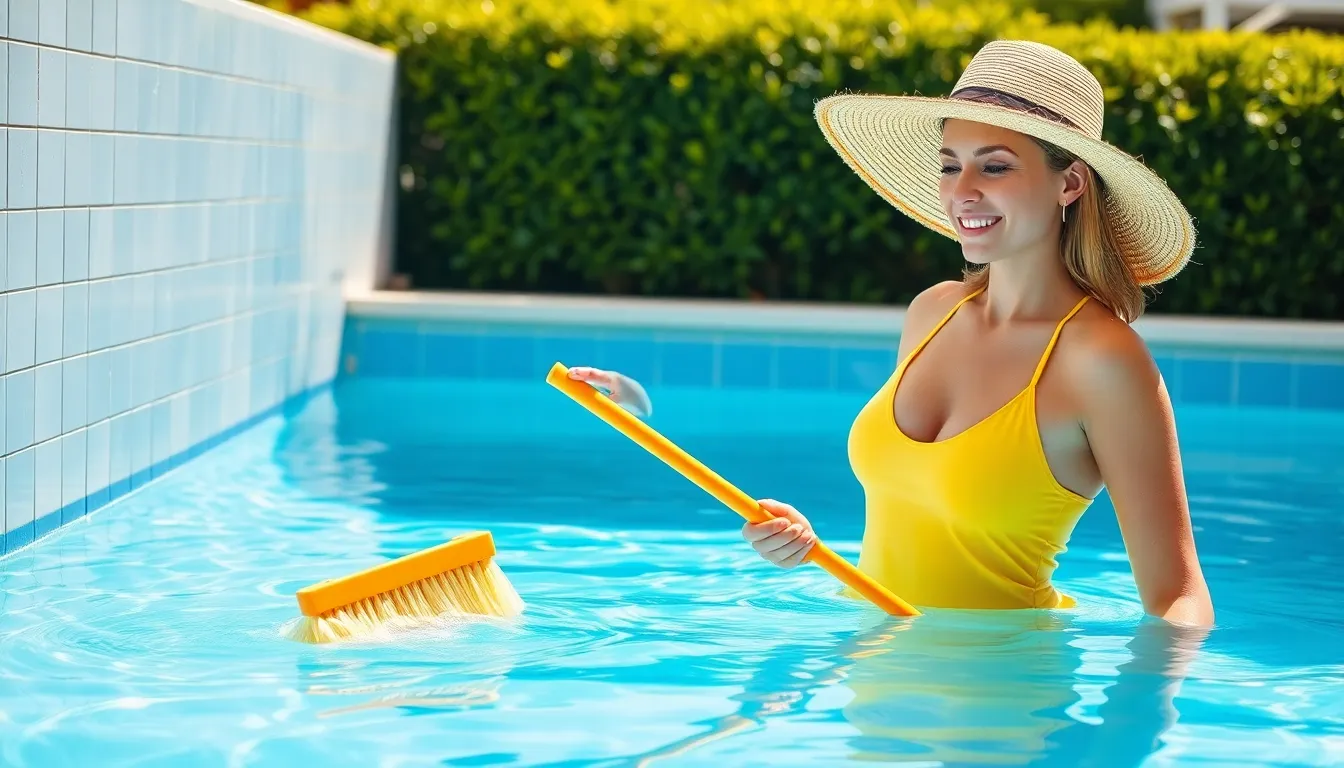Keeping a pool sparkling clean isn’t just a luxury; it’s a necessity. Imagine diving into a pool that looks more like a science experiment than a refreshing oasis. That’s where brushing those pool walls comes in. It’s not just about aesthetics; it’s about maintaining a healthy swimming environment.
Table of Contents
ToggleImportance Of Brushing Pool Walls
Brushing pool walls is crucial for maintaining a clean and enjoyable swimming environment. Regular cleaning enhances pool aesthetics and overall safety.
Benefits Of A Clean Pool
A clean pool offers multiple advantages that contribute to an enjoyable swimming experience. Clear water enhances visibility, making it safer for swimmers. Additionally, a well-maintained pool minimizes the growth of algae and bacteria. Reduced growth leads to lower chemical use, saving money over time. Sparkling pools often attract more users, boosting social interactions. Overall enjoyment increases when the pool looks inviting and pristine.
Health Considerations
Health factors play a significant role in pool maintenance. Clean pool walls prevent the buildup of harmful microorganisms. Neglecting brushing can lead to skin irritations and infections for swimmers. Maintaining proper hygiene also reduces the likelihood of illnesses caused by contaminated water. Consistent brushing and cleaning contribute to better water quality, ensuring healthy swimming conditions. Regular maintenance promotes a safe swimming environment, providing peace of mind for all users.
Best Practices For Brushing Pool Walls

Brushing pool walls is essential for cleanliness and maintenance. Following best practices enhances the effectiveness of this task.
Choosing The Right Brush
Selecting the appropriate brush significantly impacts maintenance efficiency. Use a brush with nylon bristles for most pool surfaces, as these resist wear while effectively removing dirt. For concrete or rough surfaces, opt for a brush with stainless steel bristles for deeper cleaning. Consider the pool’s shape; corner brushes often help reach tight areas. Assess the brush’s durability, ensuring it lasts through regular use. Confirm that the brush’s handle extends to maintain comfort and provide adequate reach.
Techniques For Effective Brushing
Employing the right techniques maximizes the benefits of brushing. Start by brushing from the top down, allowing debris to fall into the pool for easier vacuuming. Focus on corners and tile lines, as these areas tend to collect more dirt and algae. Brush using long, smooth strokes to cover large areas efficiently. Be consistent, brushing walls at least once a week to prevent buildup. Use a routine that integrates brushing with regular cleaning schedules, creating a holistic maintenance approach.
Common Mistakes To Avoid
Avoiding common mistakes during pool wall brushing ensures optimal maintenance and cleanliness. Here are some pitfalls to watch out for.
Over-Brushing
Over-brushing can harm the pool surface. Brushing too aggressively can create scratches or damage surfaces, especially those made of plaster or vinyl. Heavier brushes or excessive force lead to surface wear and tear, resulting in costly repairs. Establishing a gentle approach allows for effective cleaning without compromising integrity. Consider brushing with moderate pressure and focus on routine maintenance instead of forceful scrubbing.
Neglecting Other Pool Areas
Neglecting other pool areas while focusing solely on walls compromises overall cleanliness. Waterline tiles, steps, and corners also harbor dirt and algae. A comprehensive cleaning approach addresses these neglected sections, enhancing the pool’s appearance and health. Failing to clean these areas can lead to increased chemical usage and additional health risks. Ensure to brush and vacuum other sections of the pool regularly, maintaining a thorough regimen for optimal hygiene and enjoyment.
Maintenance Tips For Pool Walls
Maintaining clean pool walls enhances both appearance and hygiene. Regular brushing forms an essential part of this maintenance.
Frequency Of Brushing
Brushing pool walls at least once a week promotes cleanliness. Increased brushing frequency may be necessary during hotter months or after heavy swim activity. More frequency prevents dirt buildup and algae growth. Weekly routines help in identifying and addressing trouble spots effectively. Skipping brushing can lead to visible grime and unsightly bacteria. In high-traffic areas, consider brushing twice weekly. Consistency ensures a healthy swimming environment.
Seasonal Considerations
Seasonal changes impact pool wall maintenance. During summer, increased usage leads to more debris and algae. Regular brushing keeps the pool walls sparkling and reduces the need for excessive chemicals. In fall, leaves and debris accumulate; brushing removes these contaminants before they settle. Winter presents unique challenges; while brushing less frequently may suffice, monitor for algae that thrives in warmer indoor pools. Adapting the brushing routine according to seasonal challenges ensures optimal pool cleanliness year-round.
Maintaining clean pool walls is vital for a safe and enjoyable swimming experience. Regular brushing not only enhances the pool’s appearance but also plays a key role in preventing harmful microorganisms. By incorporating effective brushing techniques and adhering to a consistent maintenance schedule, pool owners can significantly improve water quality and overall hygiene.
Adapting brushing routines to seasonal changes and usage patterns ensures that pools remain inviting and healthy year-round. With the right tools and a thoughtful approach, anyone can maintain a sparkling pool that promotes relaxation and social enjoyment. Ultimately, a clean pool is a reflection of care and commitment to health and safety.



